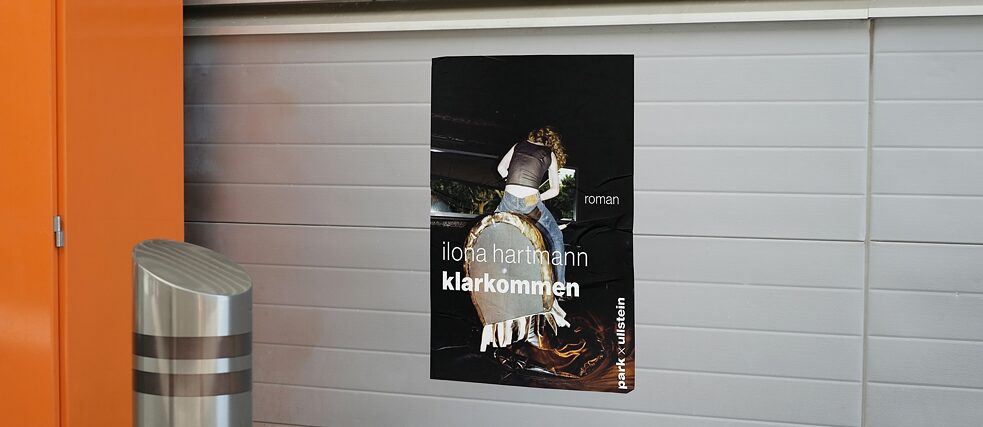Cherrypicker | Literature
Finding their feet

Ilona Hartmann presents an anti-novel for young adults that breaks with the illusion that the years of our youth have to be just wonderful from start to finish. As a counterpoint, the author portrays the mind-numbing mediocrity of the daily lives of three young people who move to the big city
“I genuinely did want to squander my youth, but not like this,” states the prologue in klarkommen (Finding their feet) – which is the title of Ilona Hartmann’s second novel, published in February 2024. The 34-year-old became known for her brief observations about contemporary events on Twitter; her debut novel Land in Sicht (Land ahoy) appeared in 2020.
klarkommen is about three young friends who, having grown up in a small town, have now left school and want to move to the big city together. The first-person narrator, who remains nameless, and her friends Mounia and Leon have dreamt of taking this step for far too long. But when they finally arrive, the reality they face is by no means as rosy as they had pictured: the city is expensive, their flat is a dump and they only ever find out about the really cool parties once they have already missed them.
The first-person narrator in particular repeatedly dashes her own chances of getting involved in something exciting. At times it is her own insecurities that are to blame, at other times her pride. As Ilona Hartmann tweeted about her book: “klarkommen tells the moving story of three young people who you just want to slap in the face all the time.” And she is not wrong.
Short and to the point
With just 188 pages (some chapters are less than one page long), this novel for young adults is not only a gift for readers with a short attention span; it also reveals in brusquely honest fashion just how boring one’s teens can be. And does so with a shrewd and amusing lightness. For some readers, the description of everyday life is bound to come as a relief. And even those wild go-getters who are never bored for a second will find that some of what the first-person narrator says resonates.“There are plenty of cool books that have loads going on in them. Sometimes, however, what is needed perhaps is something of a counterweight to show that there have also been other times and that there are other lives,” the author said in an interview about her book launch. And Illona Hartmann does a wonderful job of providing this counterweight in klarkommen: in amongst all the seemingly insignificant events that the three young people experience are to be found some very pointed observations of everyday life. All of them could well have featured in my own diary, though I would never have been able to formulate them as accurately and realistically as the author does.
Missed opportunities
What is regrettable is the failure to elaborate further on some of the narrative threads. Ilona Hartmann serves up a number of undeveloped plot strands to her readers but leaves it up to them to imagine how they will turn out. At some points the story genuinely suffers as a result. Yet is that not also what real life is like? Ilona Hartmann claims it is – and I agree. How often does one resolve to take a good idea a step further, or to get in touch with an old friend again, or to leave the house a bit more often? Ultimately, however, around 70 percent of such good intentions never make it any further than our own minds. And that’s also what happens to the first-person narrator.FOMO (fear of missing out)
What makes klarkommen a novel for my generation, generation Z? Perhaps because virtually everything the first-person narrator thinks or is curious or panicked about boils down to the FOMO (fear of missing out) phenomenon. It is that sense of never quite getting there, never having tried everything out, never being part of the crowd (or one of the cool guys) that klarkommen describes. This is also confirmed by what the father replies to the first-person narrator when describing his youth: “Hard to compare to today. You have more opportunities, but we had fewer uncertainties.”Sooner or later, everyone has to find their feet
In a chapter entitled Druck (Pressure), the first-person narrator admits: “Every time we read the news, either intentionally or by chance, we were overcome by the oppressive sense that we needed to start blossoming as soon as possible.” Pressure is looming around every corner. And sometimes it is generated only by the desire not to appear embarrassing in everything one does. There are one or two points in the book that quell this feeling, however. Such as Frau Heiner, the worldly-wise pub landlady. Without giving answers to questions, she manages to dispel the pressure and worries of the first-person narrator. And yet even Frau Heiner comes across as somewhat lost at the deserted supermarket in the evening.With her brutally honest and thus very likeable novel, Ilona Hartmann succeeds in building a bridge to young people who are their own worst enemies or have excessively high expectations of their youth. Anyone who reads between the lines will not be left empty-handed by klarkommen.
Ilona Hartmann: Klarkommen. Roman
Berlin: park x ullstein, 2024. 187 p.
ISBN: 978-3-98816-004-1